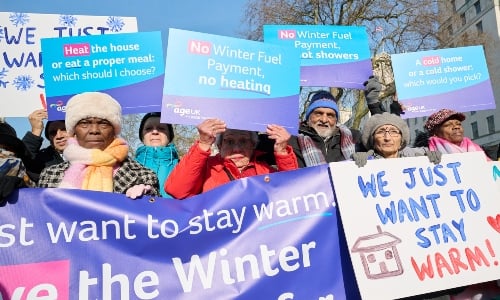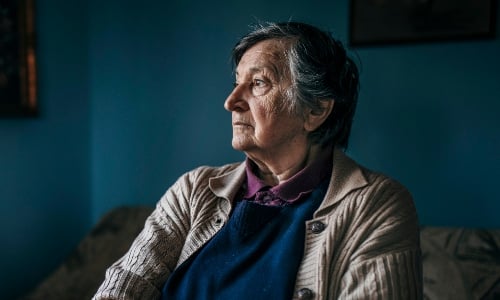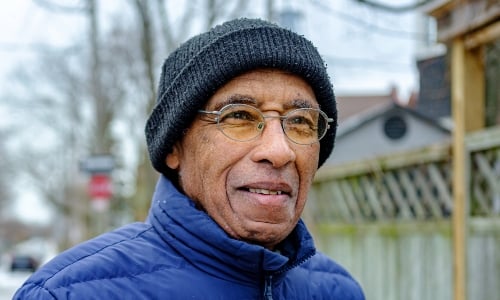As of Friday 13 September 2024, it’s official: more than three quarters of a million older people on very low incomes will lose their Winter Fuel Payment this year because they won’t be claiming the Pension Credit they’re entitled to.
‘Official’ because in answer to a Freedom of Information request, the Department of Work and Pensions released an internal document on that day that says this. So, despite protests from Government spokespeople that everything is going to be fine since the poorest pensioners will still get their Winter Fuel Payment, we now know this isn’t true.
And the Government knows it too.
It's also notable that the same official document discloses that the over-80s will be the hardest hit of all, and that well more than a million disabled and sick older people will also lose their Winter Fuel Payment because of the change. Given that the latter generally need to use more energy, pushing up their bills, this spells big trouble ahead for those on low or modest incomes. When the temperature drops some will be forced to choose between running essential medical equipment, keeping their home warm, and eating a nutritious diet – when for their health they need to do all three.
The Government must help struggling pensioners this winter
Surely this means the Government has a responsibility to bring forward measures to mitigate the impact of this brutal means-testing policy on the estimated 2.5 million older people set to lose their Winter Fuel Payment, and who are in no position to withstand it?
That’s certainly the argument Age UK will be making as forcefully as we can over the next few weeks, in the run up to the Chancellor’s Budget. It’s not too late for the Government to avoid a looming catastrophe this winter – but they need to act quickly.
At Age UK we would be delighted to work with the Treasury and the Department of Work and Pensions to come up with the most effective package of measures. It’s not overdramatic to say that some older people’s lives may depend on it.
Policies on pensioner health and benefit are contradictory
The fact we have ended up in this disastrous situation is quite telling. Last week, Lord Darzi produced his report about the state of the NHS. In his response, the Secretary of State for Health and Care, Wes Streeting MP, explained that there were three big shifts that we need to engineer to put the NHS on an even keel for the future. One is to bring care ‘much closer to home’, especially for our growing older population. Far too many older people end up waiting for long periods in A&E, and then in a hospital bed once fit to be discharged because of a lack of care in the community.
At Age UK, we entirely agree: we need to do much more to support older people to stay as fit and well as possible in their own homes. This means moving some resources out of hospital and into the community. It also means strengthening and joining up primary care, community care – like District Nursing – and social care.
The second shift outlined by Wes Streeting MP is that more of us are ageing in our own homes with health problems and disabilities.
This can include living at home withserious ongoing health conditions like cancer, heart disease and dementia, when previously we might have been in a care home, a hospital – or, indeed, might have not survived at all, compared to 20 or 30 years ago.
It’s a big shift, and a welcome one – most older people would much rather stay in their own homes for as long as they can. However, it has policy consequences that we can’t ignore. It means, for example, that we have increasing numbers of older people living in their own homes who are severely disabled or in failing health, including many approaching the end of their lives. We need to support them to stay as well as they can and to die pain-free and with dignity when the time comes – but we are simply not geared up to do this now, as Lord Darzi correctly observed.
The Government’s Health and Winter Fuel policies are also at odds with each other.
When you think about it from this point of view, removing Winter Fuel Payment from most pensioners of all ages, except for a small minority who are very poor and claim Pension Credit, makes no sense at all. It guarantees that many hundreds of thousands of older people – possibly millions – will struggle to stay as warm as they need to for their health this winter.
The numbers who become sick are certain to rise. Colds and flu are more likely to lead to chest infections and pneumonia. Hypothermia will stalk those who become very cold. More pensioners will need urgent medical attention from community health services and hospitals. It’s the last thing they or the NHS need.
Government structures should better reflect older people's lives
Why wasn’t this blatant contradiction spotted before the disastrous Winter Fuel Payment policy was announced at the end of July?
One reason is because there is no Minister for Older People in Government and no independent Commissioner for Older People and Ageing. There’s no group of officials whose job it is to look at policy towards older people in the round. Nor are there any special advisers linked to this work who are charged with engaging with external stakeholders like Age UK, who could pick up intelligence about trends and concerns to help Government departments create policy fit for an ageing society.
When you consider that we have a rapidly growing older population, this is extraordinary. It's high time we institutionalised knowledge and understanding of older people within Whitehall systems and structures. Without that, more catastrophic policy mistakes are likely to be made, simply because officials and Ministers fail to anticipate the likely outcome of their decisions on the 12 million or so pensioners in our country. We saw this repeatedly during the pandemic and I think we are seeing it again now.
So as well as responding, and fast, to prevent the car crash we are heading towards as regards the health and wellbeing of millions of poor, sick and disabled older people this winter, the Government should also look urgently at incorporating knowledge of our older population into its structures and ways of working. Because from what we’ve traditionally seen from governments, the totality of older people’s lives is very poorly understood.






